She had waited for days to speak to her eight-year-old daughter about Canada. But Samia knew she couldn’t wait any longer. She stepped out of her tent, gazed at the rolls of barbed wire confining them and rehearsed the question she had to ask.
It was the beginning of the family’s fifth spring in the Al Roj refugee camp in Kurdish-held northeast Syria, the spring Samia hoped would be their last. (Her name, those of her children and some aspects of their identities have been changed to protect them.) She could hear her four-year-old son, Omar, wheezing in his sleep. She called softly to Maya to join her outside.
“Maya, we need to talk about Canada,” Samia said, unable to hide the tears slipping down the almond-shaped opening of her niqab. Maya had lived half her life in the camp and had never been to Canada. But she knew it is a place where children eat ice cream and read books instead of worrying about rocket fire and staying warm. She knew that she and Omar are Canadian through their father, who disappeared years ago. She also knew that other Canadians had been allowed to leave Al Roj for Canada.
But Samia is not Canadian and so Canadian authorities will not let her accompany her children to this country. Samia pulled Maya close.
“Would you like to take Omar and move to Canada, just the two of you?” Samia asked, her voice trembling. Samia saw that Maya couldn’t fully grasp what her question meant. She saw the panic in the child’s eyes. Fear and grief engulfed Maya’s frame as the idea sank in that she would have to leave the only parent she knew. Her pain erupted in a piercing wail. The only explanation for the question that made sense to Maya was that her mother didn’t love her anymore, Samia recounts.
Samia’s question was the result of a Canadian government policy designed to protect Canadians from the potential violence of Islamic State of Iraq and the Levant (ISIL) supporters on Canadian soil. Since 9/11, Canada, like many other countries, has tightened immigration laws to restrict entry of non-citizens it deems a threat.
But advocates say security policies intended to protect Canada are denying basic human rights to Canadians in Syria. These policies result in the same kind of family separation — albeit on a much smaller scale — that Canada condemned when migrant children were taken from their parents at the southern border of the United States. Some compare it to the family alienation Indigenous children experienced when they were taken from their parents and forced into residential schools, a policy Canada regrets. Now, 13 Canadian children held for the past five years at Al Roj on a toxic oil field in Kurdish-led northeast Syria have been told that they can go to Canada — but their three mothers cannot.
One of the three is Samia, who, with Maya and Omar, is living with about 52,000 others, mostly women and children, in two sprawling locked camps known as Al Roj and Al Hol. They have struggled to survive with scarce food, contaminated drinking water and rampant preventable illnesses, including hepatitis, tuberculosis, parasites and chronic diarrhea. They are under constant risk of being injured, killed or trafficked.
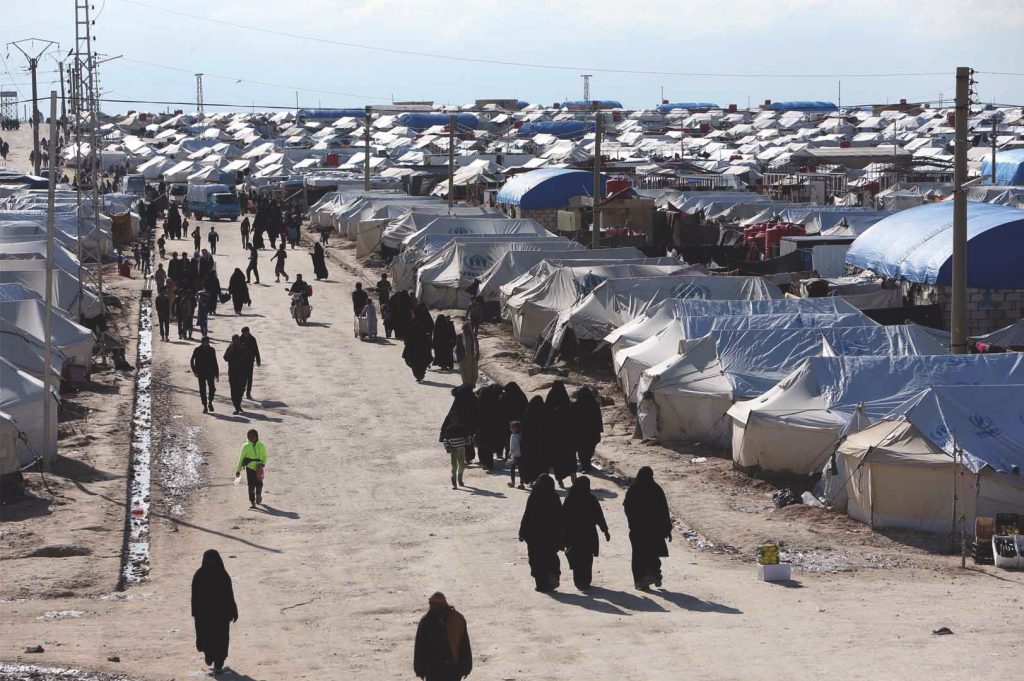
International humanitarian organizations have assessed Samia’s children and found them to be underweight, in need of immediate medical attention and at high risk of death from a preventable disease. Both children suffer from anxiety and post-traumatic stress, and Samia worries that these mental health issues will intensify the longer they stay in such harsh conditions. International observers have expressed the same fears about other children in the camps. As a girl, Maya also faces an extreme risk of becoming a victim of sexual violence and murder.
This leaves Samia with an impossible choice: keep Maya and Omar together with the only person who loves them but in danger of dying in the camp, or send them to the safety of foster care in Canada, where they will almost certainly never see her again.
The children remain in limbo because Samia and the other adults at Al Roj are suspected of links to ISIL, which was defeated in 2019 in the Syrian civil war by Kurdish and NATO forces. In the years since, the Kurdish-led authority, the Autonomous Administration of North and East Syria, has been detaining ISIL suspects and their family members in prisons and camps in its triangle of territory as the civil war simmers on.
But the Kurdish-led authority lacks the resources to offer the more than 40,000 detainees from foreign countries their day in court. The authority has repeatedly asked the international community to take its citizens home. Despite pleas over many years, more than 15,000 foreign adults and 22,000 children from 60 countries remain in the Al Hol and Al Roj camps without having been convicted of a crime. (About 12,000 detainees are local to Syria.)
More on Broadview:
-
Torn apart from their families, Uyghur exiles look to Canada in hopes of a better life
-
Community support helps refugee family find home amidst Canada’s housing crisis
-
Is it ethical for Canada to recruit health-care workers from countries with worse healthcare crises?
Samia and Maya told their story to Broadview in two ways. The first was through an in-person discussion in August 2023 at Al Roj with Senator Kim Pate and Alex Neve. Neve is a senior fellow at the Graduate School of Public and International Affairs at the University of Ottawa. Pate and Neve were on a humanitarian visit to speak with detained Canadians to assess their health and well-being. The mother and daughter also communicated via their Toronto lawyer, Asiya Hirji. Talking to western media, even through intermediaries, is risky. ISIL considers it disloyal, and supporters within the camps have threatened or killed others for doing the same.
Samia says that she is innocent of any crime. She says she was one of thousands of women who were kidnapped and trafficked to Syria’s northern city of Raqqa, ISIL’s seat of power, during the early years of the Syrian war. She was a student in her own country who responded to a Facebook request for humanitarian aid to help injured victims in the Syrian war. (Broadview is not naming her country of origin to help protect her identity.)
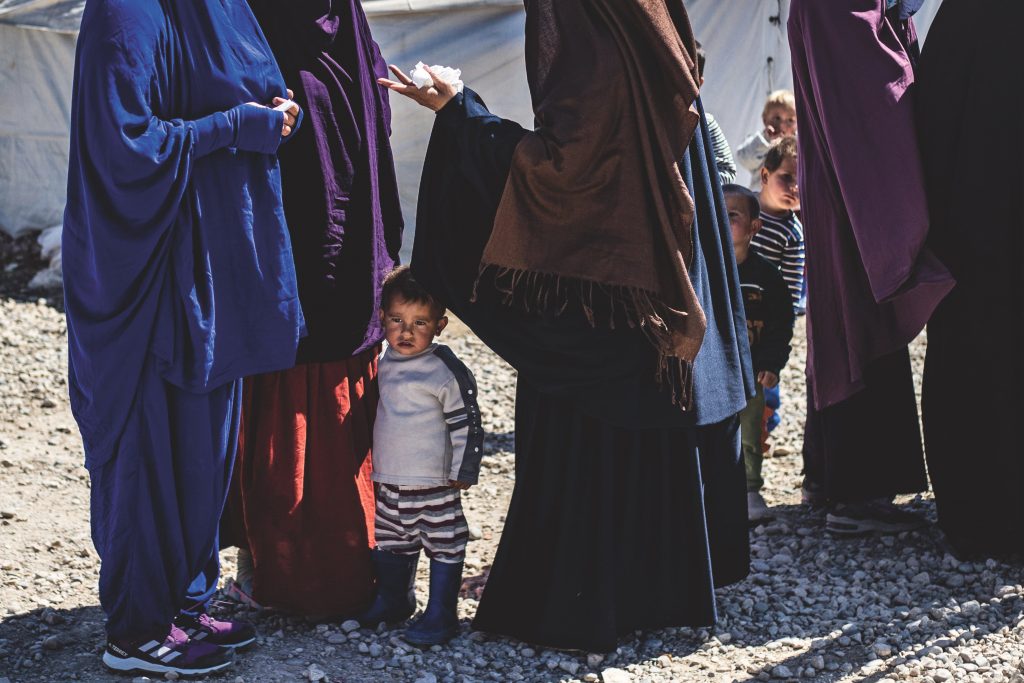
When she arrived in Syria, Samia was picked up by traffickers, posing as associates of the aid workers, and taken to a house for brides-to-be. She was “married” within days to a Canadian who had volunteered to fight for ISIL. Other women took their own lives rather than be enslaved by ISIL militants. Many, like Samia, who survived life under ISIL, eventually moved to Al Roj and Al Hol, only to continue living as captives.
Hirji was appalled and infuriated when she heard first-hand of Samia’s torment. “Samia made a mistake when she chose [to travel to Syria] as a young student,” Hirji says. “Her ‘marriage’ was terribly abusive. What she was forced to endure was horrific.”
Samia’s “husband” vanished in 2019 when Maya was four years old and Omar was a baby. A few weeks later, Samia used all her courage to take the children to the safety offered by western soldiers, dodging gunfire and airstrikes on their home in the ISIL caliphate.
“We are innocent, Maya, they will help us,” Samia had explained. But the help turned out to be brief. Instead of finding safety, the family was turned over to the perils of the camp.
Almost five years have passed since the young mother last saw the man she was forced to call her husband. She now lives in fear, isolation and despair, suspected of supporting the same organization that terrorized her.
Samia still bursts into tears remembering the man’s physical and emotional abuse.
She suffers from insomnia, depression and suicidal thoughts. She’s “deeply traumatized,” Hirji says, but “she is fighting to stay alive for her children.”
***
While Canadian courts will not allow Samia to accompany her children to Canada, Canadians who have spoken with Samia have described a desperate parent, not an activist warrior. They point out that she is in a legal catch-22. She has not been charged with a crime yet has no legal mechanism to clear her name. She is being held out of reach of courts, the protection of the law and the rigour of justice.
“It is abundantly clear how devoted she is as a mother,” says Neve, who is also a former Amnesty International leader. “It is impossible for her to imagine being apart from her children. They have been everything to each other.”
Conditions in the camp are deteriorating, and Samia is worried about keeping her sickly children alive. The family sleeps shoulder to shoulder under a canvas next to overflowing latrines. Their shelter flooded with freezing, fetid water in the last week of 2023 during a cold snap. Al Roj’s tents also often collapse in strong winds, leaving families exposed to mounds of garbage and scavenging wild dogs.
The family needs much more humanitarian support, Pate says. And the children are entitled to it. Pate is outraged that Canadian victims of such a horrible war have not received consular support and that the federal government appears to prefer severing children from their mothers over offering the women fair trials.
Samia and the other non-Canadian mothers are willing to be held accountable if they have done wrong, Pate says. But without evidence of wrongdoing, Pate believes separating children from their mothers is unnecessary and cruel.
“Surely the horrific legacy [of residential schools] for Indigenous generations should tell us volumes of the long-term negative consequences of government policies [that take children from their parents],” Pate says.
***
Samia keeps Omar inside because he cannot see well enough to navigate the rocks and uneven ground outside. He urgently needs surgery to prevent genetic blindness, and eyeglasses are a luxury that Samia cannot afford.
Still, in the sunlight filtering through the tent’s many patches, Omar plays with toy blocks, turning them into mighty towers, vehicles of all sorts and imaginary friends. His hair, curly and untamed, bobs as he circles gleefully around his creations. In every new game Omar invents, his eyes find light. But as the afternoon light dims, the child’s thoughts return to food and warmth and he often cries.
Once sociable and lively, with long legs and a slender face, Maya has learned to trust no one. She is bored and restless in the desolate camp. Especially in winter, when the hours of light are fewer, her days feel intolerably long. She finishes her housework quickly, but there is nowhere to go. She longs to go to a zoo, to a playground or to school.
Human rights advocates compare Al Roj to the Guantánamo Bay detention camp in Cuba, where the United States detained suspected Muslim militants without trial after the terror attacks of Sept. 11, 2001. Neve, who has made multiple visits to Guantánamo, compared Canadians at Al Roj to Maher Arar, a Canadian citizen deported from the United States to Syria, and Omar Khadr, a Canadian child accused of war crimes, both of whom were abandoned by the Canadian government during the U.S. war on terrorism.
Want to read more from Broadview? Consider subscribing to one of our newsletters.
“Then it was al-Qaida; now it is ISIL. But the fundamentals are the same,” wrote Neve, Pate and other human rights advocates in a September 2023 essay published in the Ottawa Citizen. “People are warehoused far beyond the reach of the courts.”
Although the fundamentals are the same, the current Syrian detainee situation is more alarming than Guantánamo, Neve says. At Guantánamo, 780 men were held over the course of more than 20 years.
But in northeast Syria, he says, about 52,000 people are held as terrorists without access to even rudimentary legal attention and with very little outside help. More than 60 percent of these detainees are children, according to Human Rights Watch. Of those, nearly 80 percent are under the age of 12, and 30 percent are five and under. Most, including some Canadian children, are detained not because they are personally suspected of war crimes, but because their parents are.
“Months have become years, and soon will become decades,” Neve says.
“And we think this is justice?”
Life in Al Roj is becoming more dangerous. Many of Al Roj’s detainees are loyal to ISIL and have attacked those inside the camp they deem to oppose them. Even a suspicion that Samia might be disloyal has resulted in threats on her life, she told Hirji.
Samia has been homeschooling Maya in English because she does not want her to learn Arabic or be radicalized at the camp school. But new books are impossible to buy, and online access is prohibited.
On top of all the other worries, Samia, like other women in the camp, must pretend to seem loyal to ISIL to protect her family, while trying to teach her children western values so they will feel at home, one day, in Canada.
***
Western governments have had different responses to women in Samia’s situation. For instance, British-born Shamima Begum was shunned by her country. Suspected to have been trafficked to Syria at 15, she was forced to marry an ISIL fighter and gave birth to three children, all of whom died as infants. The United Kingdom cancelled her citizenship on national security grounds in 2019. By contrast, Laura Passoni was welcomed back to Belgium after moving to Syria with her four-year-old son while her partner was fighting for ISIL. Belgium repatriated her with her son and gave her a three-year suspended sentence.
Canada has mostly ignored its citizens in detention in Syria, according to Ottawa-based lawyer Lawrence Greenspon. The country repatriated 23 Canadian women and children only when ordered to do so by Canadian courts.
Greenspon, who practises criminal defence and personal injury law, has been leading a multi-year legal battle to force the Canadian government to repatriate men, women and children who he says have been “arbitrarily detained,” their basic human rights ignored, in northern Syria.
The first came home in October 2020 after a year of pressure on the government. She was a five-year-old known as Amira who was born to Canadian parents in the caliphate and found wandering alone near Baghouz after her parents were killed.
“It’s been a battle to get the Canadian government to do what…they should do in regard to Canadian citizens whose rights have been violated,” Greenspon says.
Greenspon reached an agreement with the federal government in January 2023 to bring home six Canadian women and 13 children who had been part of a court action. But one Canadian and three non-Canadian mothers, including Samia, were refused entry with their Canadian children because the women were considered at too high risk of supporting ISIL to be allowed even temporary Canadian residence. “To separate a mother from her children is contrary to every international children’s rights convention to which Canada is a signatory,” Greenspon told CBC News in April 2023.
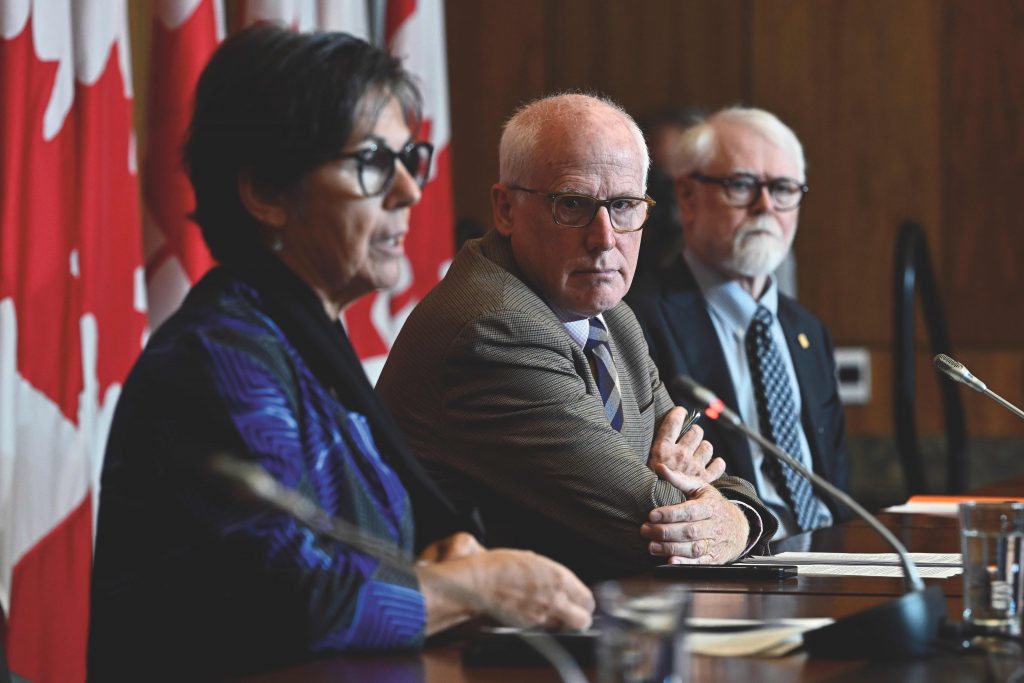
Global Affairs Canada has argued in other cases that mothers in the camp “adhere to extreme ideological beliefs” and would be a “security threat” if brought to Canada because they might aid or abet terrorists.
Greenspon has argued that if mothers of Canadian children pose a risk, the government should patriate them and either charge them with a crime or place them under a constraint called a peace bond that requires them to maintain good behaviour or face a prison sentence.
In response to questions about Samia’s case, Global Affairs spokesperson Pierre Cuguen wrote in an email: “Requesting repatriation for one’s child is an incredibly difficult decision and one that must be made by the parent and the parent alone.”
Cuguen also said that non-Canadians, like Samia, “may apply to immigrate to Canada through our immigration pathways and the Government of Canada evaluates each application on a case-by-case basis.”
But Canada’s official wait time for refugee applications is more than two years, according to its Immigration and Citizenship website.
Time is running out for Maya. She will soon turn nine, the age at which remaining pockets of ISIL fighters begin procuring and marrying girls to their men. ISIL eagerly pays for children to be smuggled out of the camps, according to the Middle East Institute. They seize teenage boys to help the group’s continued fighting near the Iraq border and girls to marry fighters. Maya, whose mother may be suspected of disloyalty for shielding her children from ISIL ideology, could be a prime target.
With the clock ticking for Maya, human rights advocates are growing increasingly desperate for intervention.
“It’s time to get serious about recognizing there is a compelling need,” Neve says. “Canada has had six years” to uphold the rights of these children, he notes.
Maya doesn’t know about the rights she has as a Canadian or about the rights she is losing. She simply gets through the days with her own stories of hope about her distant country, keeping close to her mother.
Samia is trying to help Omar get ready for Canada and speaks to him in English. But lately he has been unwell most of the time. She taught him the English word for doorknob, although he’s never seen one. He knows too well the words for scorpions, snakes and sickness.
When they get to Canada, Samia tells Omar, he will be able to see well. They will go very soon, she says, to the country they belong to, that they will love so much. They will live in a place where children can have healthy eyes and drink clean water and where, she dreams, Canadian citizens like them can grow up safe in their mother’s arms.
Samia has not spoken again to Maya about Canada since that first time in March 2023. Her options are unbearable. The family of her children’s father has not offered to let the children live with them in Canada. If she sends them here, Maya and Omar would be placed in foster care, Hirji says. Foster care could eventually lead to the children being adopted or becoming permanent wards of the state — statuses that would end their legal relationship with Samia. Their mother could vanish from their lives.
This is the part that Maya does not know and Samia will never tell her. A soft determination has set in Samia’s heart against the despair. She holds her children close, a vow unspoken between them: we will find another way.
***
Katharine Lake Berz is a writer and filmmaker who lives on Vancouver Island and in Toronto.
This story first appeared in Broadview’s June 2024 issue with the title “Impossible Choice.”
Thanks for reading!
Did you know Broadview is the only media organization in Canada dedicated to covering progressive Christian news and views?
We are also a registered charity and rely on subscriptions and tax-deductible donations to keep our trustworthy, independent and award-winning journalism alive.
Please help us continue to share stories that open minds, inspire meaningful action and foster a world of compassion. Don’t wait. We can’t do it without you.
Here are some ways you can support us:
Thank you so very much for your generous support! Together, we can make a difference.
Jocelyn Bell, Editor/Publisher, CEO and Trisha Elliott, Executive Director
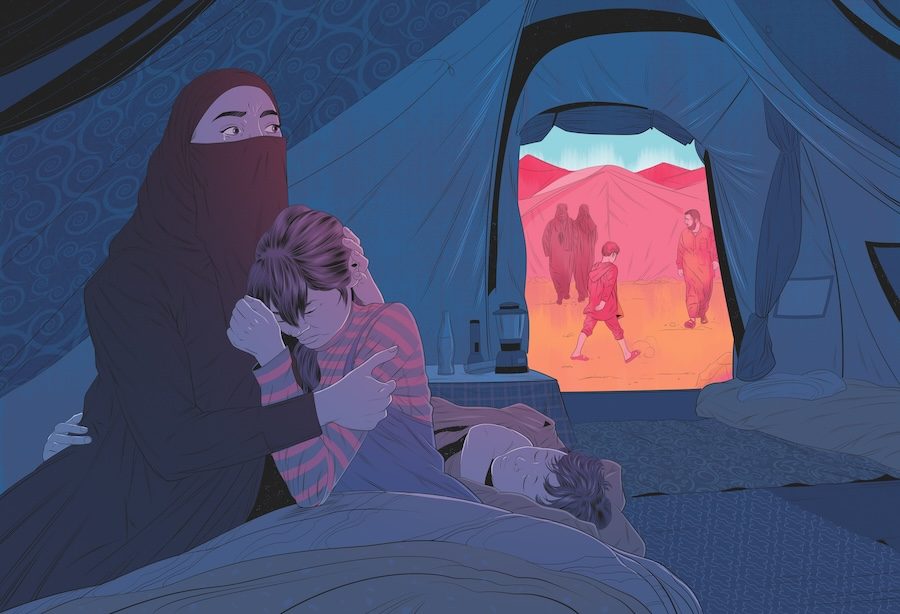
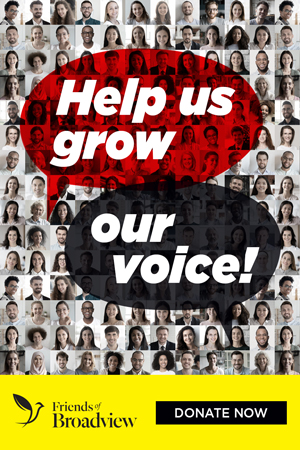
Comments